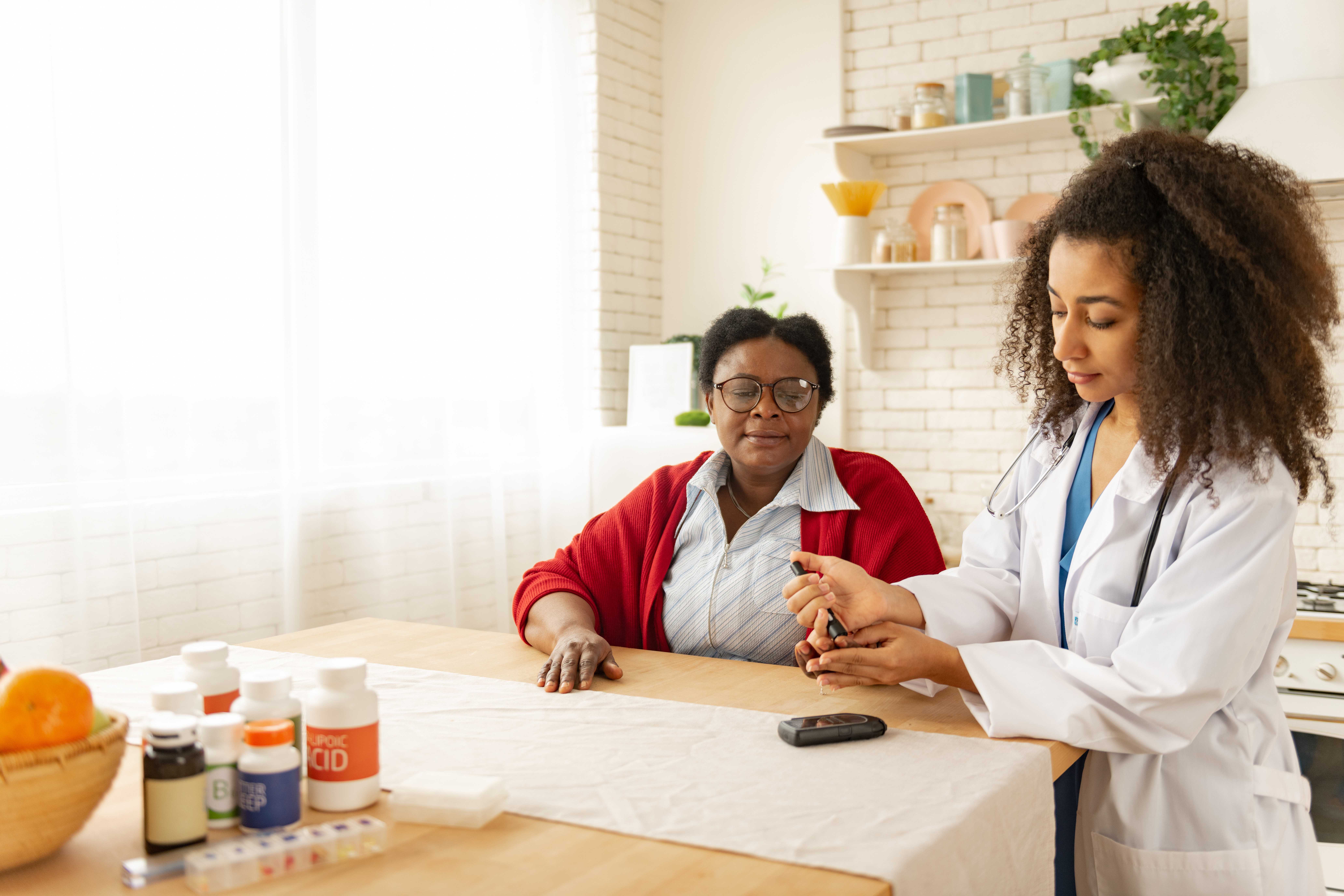Diabetes and Caregiving: Helpful Tips

Table of Contents
A diabetes diagnosis affects the person diagnosed with the condition and has a ripple effect into family, friends, and loved ones.
As caregivers of someone with Diabetes, we stay current on studies, tech, medicines, interactions and diets, as well as recognize the sign or symptoms when something is off.
We have resources and support you can rely on as you wrap your arms around this life change.
Diabetes and the Caregiver

As a diabetes caregiver, you must devote time to planning your care needs.
Diabetes is the fastest-increasing disease worldwide, and existing treatments have been unable to prevent the development of chronic complications that can accompany it in many patients.
add_merchants
You are not alone in this. Over 37 million people of all ages (about 11% of the population) in the U.S. have diabetes. Diabetes care requires strategic planning and lifestyle adjustments like a healthy diet, regular exercise, proper medication, stress management, and daily hygiene and wellness needs — at minimum. Ok - let's look at this together.
What is diabetes?
Diabetes is a chronic disease that affects how your body turns food into energy. There are three main types of diabetes: type 1, type 2, and gestational diabetes (diabetes while pregnant).
With diabetes, our body either can’t create the hormone (type 1) or, more commonly, becomes resistant to its effects (type 2). In both cases, insulin injections are a standard treatment.
Without appropriate treatment, diabetes leads to complications with the heart, kidneys, nerves, vision, and other vital body systems.

What are diabetes resources?
Testing
Healthlabs.com is a great place to get some data if you are not sure if you may have diabetes or are just feeling tired. Get tested. HealthLabs lets you order health tests in a professional lab and then see results at home — no doctor visits necessary. The Diabetes Panel is affordable and efficient at diagnosing and monitoring diabetes.
Personalized management tools
Do you need to start a personalized diabetes management and weight loss plan? Meet Klinio.
Klinio has a diabetes clinical team of experts, endocrinologists, nutritionists, and health coaches to create a solution for your diabetes management.
 Easy to follow diabetes management diet
Easy to follow diabetes management diet Learn More
Learn MoreIt’s not your typical diet
The Klinio program is a simple and practical solution to manage diabetes, pre-diabetes, high cholesterol, and high blood pressure.
Klinio covers all diabetes management areas - nutrition, workouts, metrics tracking, medication logging, and education.
If you need help knowing what to eat and when their personalized meal plans may be the ticket to getting the nutrients your body needs and reducing the risk of glucose and insulin spikes.
Supplies for your kit
Make a kit. Make it simple, learn, and keep organized.
Companies like Total Diabetes Supply help you build your equipment with the tools and supplies for diabetes management. Continuous glucose monitors (GCM), insulin pumps, Glucose tablets or gels, glucagon shot kits, diabetic food products, accessories, and diabetic pet care supplies.
Check out Total Diabetes Supply for name brands, which offer 10% discounts, free shipping on qualifying orders, and up to an 85% discount off standard retail prices.
Food and nutrition
Does your diabetic meal routine need a kick-start? Don't know how to start with a balanced, tasty, nutritious meal? Learn from the experts and get help along the way.
Balance by BistroMD is an excellent source of "what-to-eat" inspiration, you can order prepared meals to have on hand, and their pre-portioned meals help with weight management.
We researched the meals and program of Balance by BistroMD and think their doctor-designed diabetic meal delivery is a good start. The meals are custom-made for diabetics and pre-diabetics, with loads of choices. In addition, they have free shipping on orders over $99.
Diabetes education, together
Family support is necessary to help people with diabetes manage everyday tasks and make changes. Watch for symptoms like sudden lethargy, mood swings, or ravenous hunger. These are indications of wonky blood sugar levels and action needed.
As a caregiver, you can advocate and educate the care circle on what is happening now, especially if they live far away. We also found some support groups and additional education at the following resources:
- The American Diabetes Association (ADA) covers everything caregivers and diabetes patients need to know, from health insurance questions to medical device recommendations.
- The Mayo Clinic has medical information to reinforce what you’ll learn at doctor appointments. Even the basic overview pages include additional links to boost your diabetes knowledge further and highlight topics you may haven’t considered, like the connection between diabetes and depression.
Reliable resources for care necessities
Depending on your loved one’s age, you might navigate diabetes with other health and cognitive impairment challenges.
This is when it’s essential to have the proper care necessities that make managing diabetes easier. We have three links to partners here that can help you with diabetic support devices designed to help with everyday mobility challenges (bathing and showering, using the restroom, etc.) and the latest medical tools to monitor health vitals.
Marketplaces like Carex and The Wright Stuff offer a vast selection of practical products to make every room in your loved one’s space comfortable, safe, and functional.
Financial support for diabetic needs
Diabetes requires ongoing treatment, which can be expensive, even if your loved one isn’t experiencing significant complications. Diabetes is the most costly chronic condition in our nation.
- 25% of each dollar in US healthcare spending is spent on caring for people with diabetes
- $237 billion‡(a) is spent each year on direct medical costs and another $90 billion‡(a) on reduced productivity
- 61% of diabetes costs are for adults aged 65 or older
The National Institute of Diabetes and Digestive and Kidney Disease (NIDDK) covers financial assistance in great detail, and the ADA lists several resources. In addition, check out the following sites for help with prescription costs:
- NeedyMeds: a nonprofit organization that maintains an extensive database of patient assistance programs, state assistance, medication discount programs, and free or low-cost medical care.
- RxAssist: an online database of pharmaceutical company programs providing accessible or affordable medicines and co-pay assistance.
- RxHope: an online medication resource to find assistance programs.
- RxOutreach: a nonprofit mail-order pharmacy for the uninsured or underinsured.

Advice for caregivers
Succeed with good habits.
Or what we call "Care in Action." Diabetes is manageable and does not need to interfere with their life aspirations, goals, and happiness. Eating well—and adding activity to your daily routine by moving more—are important ways to manage diabetes.
Helping someone take care of their diabetes doesn't just make them feel better. It will help them live healthier and happier lives and avoid typical diet, foot, and mouth problems. Some people need reminders and prompts, while others may need help with their diets.
Be supportive
As with any new or existing medical condition, good communication is crucial to effective diabetes management. Caregivers help people with diabetes manage their blood sugar, blood pressure, and cholesterol effectively and get preventive care.
Be proactive and consistent.
Regular monitoring and managing diabetes are essential to prevent complications. Therefore, caregivers can be proactive in helping maintain reasonable blood sugar control and overall health monitoring alongside their loved ones.
Stress can impact blood sugar levels. Therefore, stress management is a crucial part of helping manage diabetes. Practice stress-relief activities together, like gentle stretches, breathing exercises with Headspace (calming breathing tool and guided breathwork courses), or walking in a park with friends.
Diet and exercise planning
Sticking to a healthy diet and exercising regularly can be challenging, even if you don’t have a medical condition that requires constant vigilance. Plus, diabetes patients often have to manage cholesterol, high blood pressure, and other health factors connected to their diagnosis.
The ADA is great for finding dietary recommendations and tips for planning meals. They also offer meal prep advice so caregivers can spend less time.
Exercise looks different for everybody. But first, talk to the doctor about mobility concerns before planning physical activities.
One day maybe strength training with resistance bands, followed by a day with a brisk 30-minute walk.
Do it together! Get these new, healthy habits into your routine, making the experience more fun and easier to adjust.
Make new daily routines and habits.
Diabetes patients have a lot to manage daily. Help make a punch list of items you can check together in the morning, mid-day, and when you’re winding down in the evening to stay on track with daily activities. Include items that address:
- Oral hygiene, like brushing and flossing teeth after meals
- Checking for any cuts or sores that could become infected
- Drinking a specific amount of water per day
- Trimming toenails and wearing appropriate footwear indoors and outdoors
Whether you are a veteran diabetes caregiver or just getting started, there are ways to set yourself up for success with your intention and attention. As a caregiver, I was coached to be flexible, curious, and patient. That did help me out when dealing with changes associated with chronic conditions.
Additionally, diabetes management often needs adjustments and changes to treatment plans. Therefore, caregivers must be open to adjusting their approach and be willing to adapt to new treatments or changes in their loved one's health status.

All the writing, opinions, or information in this blog or website should be taken only as suggestions for your diabetes care.
If you have questions or concerns about individual health matters or the management of your diabetes, please consult your doctor, specialist nurse, or diabetes care team.
In this article we have some links to advertisers’ offers. These “affiliate links” generate income for our site when you click on them. This is one way that we keep CircleOf free for family caregivers. The compensation we receive from merchants does not influence the recommendations or advice our editorial team provides in our articles or impact the editorial content on CircleOf. We know caregiving and are caregivers. If you have a medical condition, please get the advice of a professional. We do our best to give meaningful solutions beyond and including our app.



